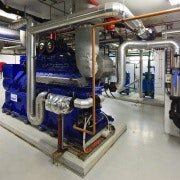GREEN DEALS: AGL timeline
AGL Energy
The prospect of a swift conclusion to AGL Energy's proposed purchase of the Loy Yang A power station will be known on May 17 after the Australian Competition and Consumer Commission updated its timeline yesterday. AGL already owns 32.54 per cent of the power station and is purchasing the rest from Japanese utility TEPCO, Thai-owned Ratch Australia and three super funds.
The deal requires the ACCC to remove a requirement for court approval for AGL to claim more than 35 per cent of the power station.
Already the deal has progressed at a pace slower than the parties would have liked, with the competition watchdog originally due to announce a decision on April 19. The ACCC moved the date back after requesting more information from AGL, and the energy retailer would justifiably be nervous about the potential for a block of the deal given its past run-ins with the watchdog (GREEN DEALS: AGL anxiety?). TEPCO – still reeling in the wake of the Fukushima disaster – would also be rather jumpy, with its need for cash seen prompting the sale of its share to AGL.
Upon providing fresh information to the ACCC last week, AGL CEO Michael Fraser said the ACCC had a couple of issues with the proposal.
"They've got two primary concerns which relate to the impact on competition and of AGL owning 100 per cent of Loy Yang," he said. "The other concern is the bidding incentives for AGL into the wholesale electricity market, should we own 100 per cent of Loy Yang."
Of course, AGL can take the deal to the courts if the ACCC blocks the move, but that would come at the cost of time and money – the former being something TEPCO may not have much of and the latter something AGL will obviously not want to waste.
TRUenergy
A float of the TRUenergy business is reportedly moving forward, with The Australian Financial Review reporting that a shortlist of advisers will be created within days, with most of the leading investment banks jostling for a seat at the table. And it is an important seat for the banks to claim, with the TRU float to be the largest of the year in Australia and the biggest since QR National back in 2010. Morgan Stanley is considered a frontrunner given its involvements in TRU's purchase of Energy Australia, while UBS and JPMorgan are also frontrunners in the race, the AFR said.
While the IPO progresses (likely to generate around $3 billion for 49 per cent of the energy retailer), the company is also working toward a brand refresh, one that is likely to see it adopt the Energy Australia name Australia-wide. TRU bought NSW-based Energy Australia from the state government last year. According to The Age, the move will see the Energy Australia logo get a touch-up, with a ‘stylised e' or an ‘eight-pointed star' the two front-running designs.
Infigen
ASX-listed Infigen Energy has extended a service agreement with wind turbine maker Vestas for its four wind turbines that use Vestas turbines (which represents around two-thirds of the company's installed capacity in Australia).
The deal will see the Danish-based firm provide turbine maintenance services and replacement components for the turbines until the end of 2017, while Infigen takes responsibility for site operation and maintenance of the balance of the plant.
Infigen said the agreement would assist the firm in achieving post-warranty wind farm costs across its Australian portfolio of $20-25 per MWh range in the medium-term.
Service fees will be determined by power production numbers.
EDF, Eneco
EDF Energy, Britain's largest power producer, and Dutch utility Eneco have joined forces to develop an offshore wind project south of England that could be big enough to supply 820,000 homes with electricity. The joint venture could deliver 900-1200 megawatts of electricity at full capacity.
The move came as British PM David Cameron said over 20 companies had signed up to turn the North Sea into a major renewable energy hub, focusing on offshore wind.
Vestas, Canadian Solar
A wave of consolidation is about to take place in the clean energy sector, at least in the minds of stock market speculators.
The share prices of Vestas Wind Systems and Canadian Solar have surged and dipped regularly on the back of reported Chinese interest. The former, the world's largest wind turbine maker, lifted 13 per cent early last week on reports that Sinovel Wind Group and Xinjiang Goldwind Science & Technology were preparing bids. The Danish firm has not commented on the speculation, but the Danish government has said it will not stand in the way of any offer. The news is welcome for Vestas shareholders as the firm's stock price hit a nine-year low a couple of weeks ago.
Canadian Solar, meanwhile, has denied Chinese media reports of takeover discussions with China National Offshore Oil Corp (CNOOC).
Consolidation is a buzz word in both the wind and solar sectors as lower prices, subsidy reductions in the key US and Europe markets and more competition suggest something has to give – and that means either takeovers or more bankruptcies. In the case of Vestas, Sinovel and Xinjiang, a tie-up – be it an acquisition or joint venture – makes sense. A CNOOC buy of Canadian Solar on the other hand, makes a little less sense. It would be more like replacing one competitor with a new one, rather than consolidation, although CNOOC has entered the solar sector recently.
















